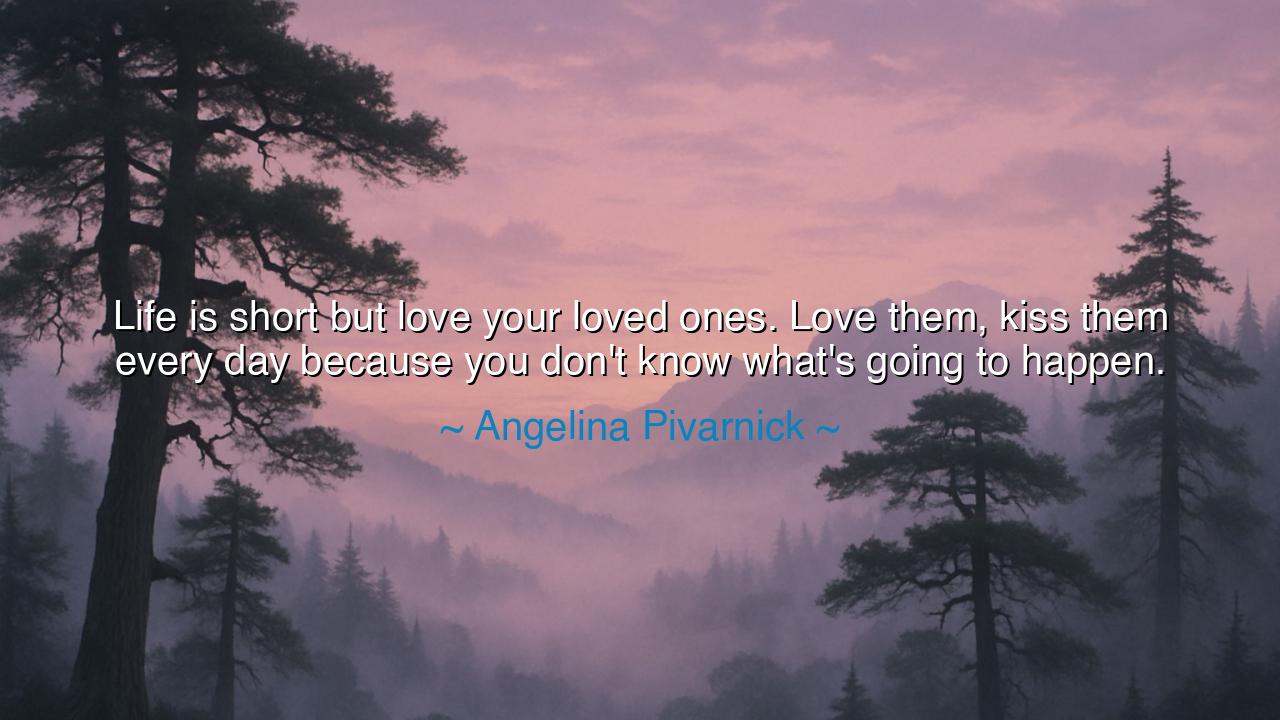
Life is short but love your loved ones. Love them, kiss them
Life is short but love your loved ones. Love them, kiss them every day because you don't know what's going to happen.






"Life is short but love your loved ones. Love them, kiss them every day because you don't know what's going to happen." These words spoken by Angelina Pivarnick echo a timeless truth that resonates with the human experience. Life, in its unpredictability, is but a fleeting moment. One day it’s full of joy, and the next, everything can change in an instant. Pivarnick calls us to recognize the fragility of life and the impermanence of time. Love is not something to be held back, delayed, or deferred for another day — it is something to be expressed freely and fully. She reminds us that every moment we have with our loved ones is precious and that we should cherish these moments with all our hearts.
The ancients understood this concept well. In their time, they recognized that love was the most sacred and powerful force in the world, and that it should be given without reservation. The Greeks had a word for love that transcended mere affection: agape, the selfless, unconditional love that binds humanity together. They believed that love was not just an emotion, but a sacred act that should be nurtured and celebrated in every relationship. The Romans also valued the importance of family and love, seeing it as the foundation of the strength and unity of the state. They knew that the bonds between loved ones were more than just personal connections — they were moral obligations, ones that were to be honored and nurtured with each passing day.
Consider the story of Marcus Aurelius, the Stoic emperor of Rome. Though he ruled a vast empire, his writings reveal a man deeply aware of the fragility of life and the importance of cherishing those closest to him. In his Meditations, Marcus often reflects on the nature of love, particularly the love between family members. He knew that even in the midst of his duties as a ruler, the moments he spent with his loved ones were the ones that truly mattered. His life, filled with the complexities of politics and war, was marked by an inner recognition that his time with his family was limited, and thus, precious. Love, to Marcus, was something to be expressed without delay, for he understood that in the end, it is those moments of connection that bring true fulfillment.
In modern times, we too often get caught up in the rush of life, believing that we have all the time in the world to show our love. We postpone the moments of tenderness, waiting for the "right time" to express our affection or to make up for past misunderstandings. But as Pivarnick wisely points out, we never know when life may change. We never know when the person we love will no longer be there to hug or to kiss. The tragedy of untold love — the things left unsaid or undone — is something we only recognize once it’s too late. We cannot wait for perfect moments; we must create them now. We must act swiftly, showing those we cherish that they are deeply loved and appreciated in every moment.
Consider the example of John Keats, the poet who lived a life cut short by illness. Despite his early death, his love for life, for his friends, and for his poetry infused every day he had. Keats often wrote of the beauty and transience of life, especially in his letter to his friend Fanny Brawne, the woman he loved. He spoke with such urgency and tenderness, acknowledging that life was not something to be taken for granted. In his final letter to her, knowing that his time was limited, he wrote, "I have loved you with a love that cannot be surpassed." Keats understood that love is best expressed now, while we are still here, and his words resonate today as a reminder of the importance of expressing love in the present moment, not tomorrow or next week.
The lesson from Pivarnick’s words and from the ancient wisdom of the Greeks and Romans is clear: love is something to be shared fully and without reservation. Life is unpredictable, and it is this very unpredictability that makes our time with others so valuable. Cherish the small moments — the morning kisses, the brief conversations, the shared smiles. These moments, though fleeting, are the ones that form the foundation of a life well-lived. Each time we express our love, we not only strengthen our bonds but also infuse our days with meaning.
Therefore, my children, let us take heed of Pivarnick’s wisdom: do not wait to love. Love freely and often. Make the effort to show your loved ones how much they mean to you in the simplest of actions — a hug, a kiss, a kind word. Do not let life slip by unnoticed, but make every moment count. Be swift to love, for in doing so, you create a legacy of affection and kindness that will live on long after you are gone. Love those around you now, for the time we have is fleeting, and it is the love we give that will remain long after the days have passed.






AAdministratorAdministrator
Welcome, honored guests. Please leave a comment, we will respond soon